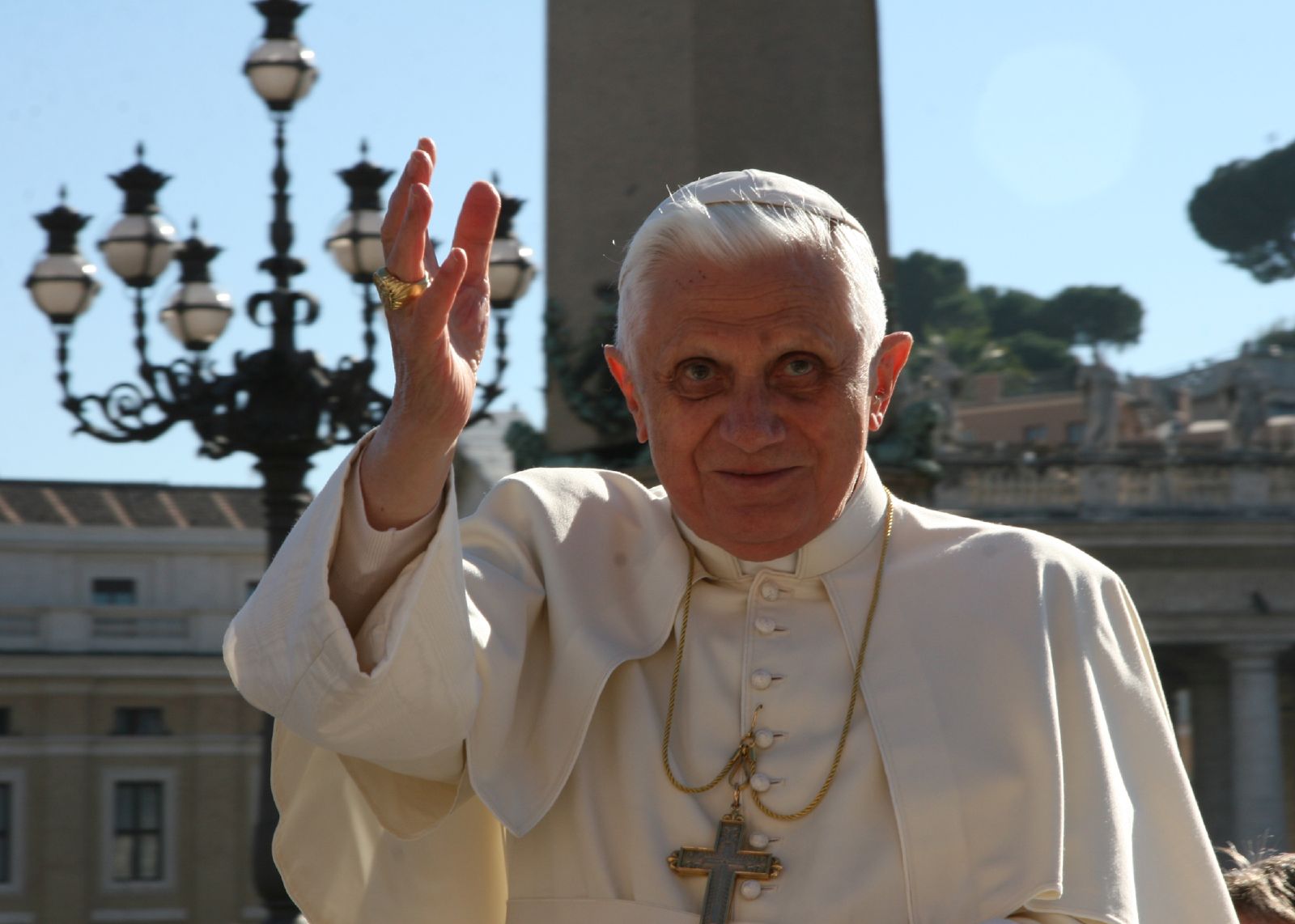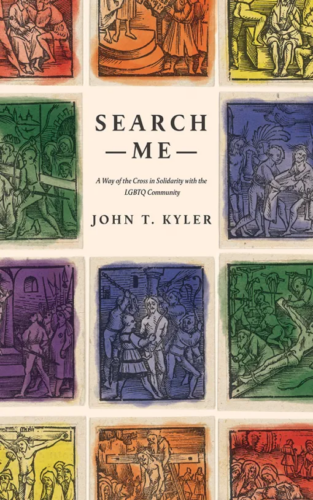While Pope Benedict XVI provided inspiration and guidance in his encyclicals on spiritual, social and economic issues; wrote three best-selling books on Jesus; and dealt with the fallout from clergy sex abuse claims revealed in the early 2000s, the late pope’s legacy on homosexuality, as explicated during his leadership of the Congregation (now Dicastery) for the Doctrine of the Faith (C.D.F.), has most affected the people with whom I’ve ministered for more than 50 years.
I had a chance encounter with Cardinal Ratzinger on a plane ride from Rome to Munich in 1998. The cardinal was seated by a window with two empty seats beside him, so I sat down next to him and began a conversation. When he discovered my name, he said with a twinkle in his bright blue eyes, “I have known you for 20 years!” He had collected several bulging files about me and my ministry during those years.
We talked about my teaching background, how I became involved in pastoral outreach to LGBTQ people, the decrease in vocations to religious life and a document for parents of lesbian and gay children that the U.S. bishops had just distributed at their recent meeting. When I told him I had copy, he quipped, “I do not yet have a copy.”
“Well, if I knew I was going to meet you, I would have brought you one!” I bantered back.
I asked Cardinal Ratzinger if he had ever met any gay people. When he and Pope John Paul II were visiting Berlin, he said, there was a demonstration of homosexuals. What a pity that he had encountered LGBTQ people only in confrontational settings, I thought.
I believe that church officials’ approach to LGBTQ persons would be more understanding and compassionate if they knew that some of their students, co-workers, relatives or friends were LGBTQ. Personal experiences draw out the pastoral heart.
Probably wishing to impress him, I volunteered, “When I was in the novitiate at the time of Vatican II, our theology teacher gave us your book to read.”
“Ah!” he smiled, “My first book!”
I believe that both he and I learned something from that encounter. At least three times during those 20 minutes, he whispered, “Providence.” I believe he was seeing the hand of God at our meeting because he had refused the request of my religious order’s superior general to meet with me. That was simply not part of the C.D.F.’s established procedures.
I was also able to put a human face on the institutional church. I found him to be warm, sincere, gracious, gentle and humorous. He was prayerful, praying his breviary when I first sat down next to him. As I left, he said, “Pray for me and I will pray for you.” I experienced the humanity of someone who had the power to disrupt my life.
Pope Benedict’s legacy for LGBTQ people
After the Second Vatican Council, there was an increased willingness by institutional leaders to reach out into new areas of ministry. One area was ministry to lesbian and gay people. For example, in their 1976 pastoral letter on moral values, the U.S. bishops stated that “homosexuals, like everyone else, should not suffer from prejudice against their basic human rights. They have a right to respect, friendship and justice. They should have an active role in the Christian community.”
The hierarchies in England, Wales, the Netherlands and New Zealand made similar statements, saying that lesbian and gay persons must be treated with dignity and respect and that all forms of discrimination against them should be opposed.
In various parts of the Western world, there was a new pastoral outreach toward lesbian and gay Catholics. Ministers were encouraged not only by episcopal statements, but also by a document from the Vatican. While the Vatican’s 1975 “Declaration on Certain Questions Concerning Sexual Ethics” dealt with human sexuality in general, there was a small section on homosexuality.
A surprising feature in this document is a statement that was not overlooked by many pastoral ministers. The document states that some homosexuals “are definitively such because of some kind of innate instinct.” Pastoral ministers interpreted this to mean that a homosexual orientation is therefore a natural part of some people’s make-up. Of course, the naturalness of a homosexual orientation implies no moral judgment on homosexual actions.
However, this openness to natural science and then-current scientific developments was hailed as opening the door to a new way of viewing sexuality.
Pope Benedict and I were on different branches, but we were both rooted in the same vine—the vine of Christ.
But in 1981, Pope Benedict XVI, then Cardinal Joseph Ratzinger, became the prefect of the C.D.F. and, in time, the architect of new Catholic teaching on lesbian and gay issues, altering the trajectory of pastoral care and outreach implemented after Vatican II. In particular, his theology tried to diminish a growing movement in the Catholic Church that urged acceptance, justice and equality for LGBTQ people. As Pope Benedict XVI, he continued and expanded such oppressive policies.
In 1986, Cardinal Ratzinger issued the “Letter to the Bishops of the Catholic Church on the Pastoral Care of Homosexual Persons.” The letter avoided the words of the 1975 document, which said that a homosexual orientation was an “innate instinct.” Instead, the new document tried to abrogate the implications of the “innate instinct” language that people were beginning to unpack.
The letter reads that “an overly benign interpretation was given to the homosexual condition itself, some going so far as to call it neutral, or even good…” On the contrary, it also states that “the inclination itself must be seen as an objective disorder.”
The term “objective disorder” caused an immense amount of anger and disagreement. It was also confusing, because it sounded as though the Vatican was calling homosexuality a psychological or medical problem, which it was no longer considered by the American Psychiatric Association. This language has been the source of hurt, distress, rage and dispute among LGBTQ Catholics and their allies for over 35 years.
The 1986 letter did a colossal amount of pastoral damage and, until recently, played an enormously strong role in repressing discussion of sexual ethics on the magisterial level.
In 1992, Cardinal Ratzinger sent the world’s bishops a private document about civil rights legislation for lesbian and gay people. It instructed bishops to be circumspect about civil rights initiatives because they may “have a negative impact on the family and society.”
It further stated that discrimination is justified “in the placement of children for adoption or foster care, in employment of teachers or athletic coaches and in military recruitment” and it compared restricting the rights of LGBTQ people with restricting the rights of “contagious or mentally ill persons, in order to protect the common good.”
In a 2003 document, the C.D.F., still led by Cardinal Ratzinger, stated that same-sex civil unions would devalue the institution of marriage. Furthermore, the adoption of children by same-sex couples “would actually mean doing violence to these children” by harming their development.
But with the election of Pope Francis, the church entered a period of more theological openness with regard to LGBTQ persons. The church is beginning to see that, from a pastoral perspective, the need to extend God’s love, compassion and mercy towards LGBTQ people is of primary importance, rather than focusing exclusively on sexual concerns. Bishops are feeling more comfortable in critiquing sexual ethics.
For example, during the 2015 synod, many bishops objected to the language of “objective disorder” and “intrinsic moral evil,” saying it was pastorally harmful and needed to be revised. A 2021 C.D.F. statement that the church could not bless same-sex couples was met with dissent from the faithful.
Many bishops in Western Europe have criticized the C.D.F. and one bishop attended a blessing service for a same-sex couple. In short, criticisms about sexual ethics voiced by LGBTQ persons and their advocates several decades ago are now resonating in the highest levels of our church.
Still, as a result of then-Cardinal Ratzinger’s pronouncements, countless numbers of LGBTQ people walked away from the Catholic Church. Is it any wonder, then, that their advocates mourn the irreparable pastoral harm caused by the legacy of Pope Benedict XVI?
Rooted in the same vine
In my meeting with the former pope, I believe each of us sensed that the other had a deep commitment to the church, in the service of God’s people. Though I did not agree with his ecclesiology or moral theology, I felt how wrong it is to demonize someone you disagree with. No person is all good or all evil. Each of us is a combination of light and darkness. And what I judge as darkness in another, someone else may perceive as light.
I believe each of us sensed that the other had a deep commitment to the Church in the service of God’s people.
I now understand that he and other church leaders were caught in a medieval structure and did not know how to break out of it. The clerical system indoctrinated them in a worldview that is static, unbending and bound by legalisms. It knows little or nothing of the compassion and flexibility of Pope Francis’ words, “Who am I to judge?”
I have learned to pray for those who feel they need to follow such a straight and narrow road in ordering their own lives and the lives of others.
In his discourse with his disciples at the Last Supper, Jesus told us that he is the vine and we are the branches (Jn 15:1-8). Pope Benedict and I were on different branches, but we were both rooted in the same vine—the vine of Christ.
In the final analysis, our theological differences are less significant than the resolve each of us has to fulfill God’s call in our lives as best we can, despite disagreement or the opinion of others. I learned that it is vital to see the humanity of others—to see what unites us, instead of what divides us.
I prefer to believe that Pope Benedict’s finest legacy is his theological insight on the Vatican II constitution Gaudium et Spes, about the ultimate authority of conscience. He wrote:
Over the pope as expression of the binding claim of ecclesiastical authority, there stands one’s own conscience, which must be obeyed before all else, even if necessary against the requirement of ecclesiastical authority. This emphasis on the individual, whose conscience confronts him with a supreme and ultimate tribunal, and one which in the last resort is beyond the claim of external social groups, even of the official Church, also establishes a principle in opposition to increasing totalitarianism.




